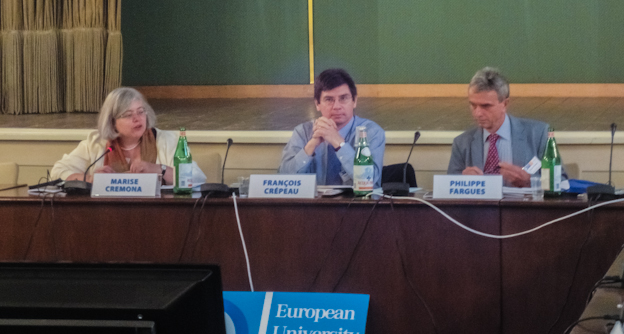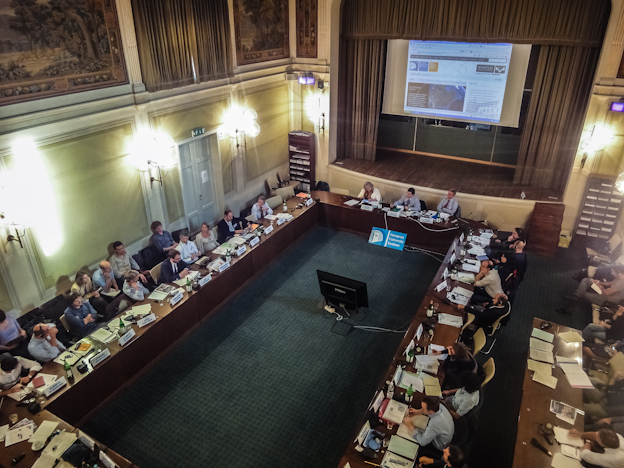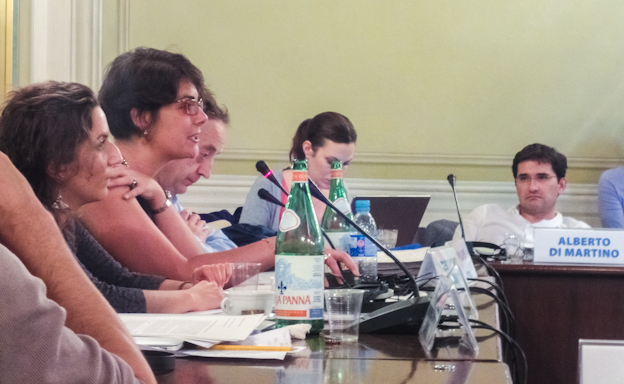The Management of the External Borders of the EU and its Impact on the Human Rights of Migrants: The Italian Experience
A Consultation between the UN Special Rapporteur on the Human Rights of Migrants, Mr François Crépeau, Civil Society and Academia
Organised with the support of the Open Society Foundations
The UN Special Rapporteur on the human rights of migrants, Mr. François Crépeau, conducted a consultation with the representatives of the civil society and academia on the 3rd of October 2012 at the European University Institute (EUI), Florence, Italy. The consultation, co-organized by the Migration Policy Centre (MPC) and the Open Society Foundations (OSF), evaluated the progress made, as well as the obstacles and challenges which remain, in protecting and promoting the rights of migrants in Italy and, more broadly, in the Euro-Mediterranean region.

European University Institute, Florence, Italy – The UN Special Rapporteur on the human rights of migrants, Mr. François Crépeau, conducted a consultation with representatives of the civil society and academia on the 3rd of October 2012 at the European University Institute (EUI), Florence, Italy. The discussion highlighted some of the major concerns in the field of human rights of migrants such as the impact of the externalisation of EU’s border control, failures in the implementation of international human rights laws, the spreading criminalisation of migrants on both sides of the Mediterranean and, the development of coercive return policies and readmission agreements.
In his introductory remarks, the UN Special Rapporteur highlighted the importance of his year long regional thematic study on the management of the external borders of the EU and its impact on the human rights of migrants. In June 2012, he visited Tunisia and Turkey and his next visit in November will be in Greece. He underlined that his visit to Italy was to better understand the Italian border management policies in practice and how it is influenced by the EU policies on migration.

In light of the financial upheaval in the global economy and the recent crises in the Arab countries, the pertinent issue of human rights of migrants is often ignored and this consultation attempted to address this issue by focusing also on the voices of migrants. Their grievances were represented in two documentary movies – ‘Closed Sea’ and ‘CIE, illegal prisons’. The movies highlighted the controversial migrant ‘push back’ policies, the practice of criminalisation of migrants and their detention in Italy.
Recommendations suggested by the panellists included a call for urgent reforms in the Italian system of first reception of migrants, in particular with reference to the need to regulate by law practices of informal detention upon arrival, interrupt collective push backs to Tunisia, Egypt and Greece, and ensure access to justice and asylum. Participants also suggested that the relevant authorities should ensure that migrants are made fully aware of their rights, such as the possibility to opt for voluntary return and its advantages, ask asylum, or seek redress against detention. Representatives of medical NGOs underlined that migrant detention centres should not be excluded from the outreach of the public health system, while lawyers’ representative highlighted the crucial need of training in human rights, migration, and asylum law for the concerned judicial personnel. Finally, participants agreed that the Special Rapporteur could encourage the European Commission to be more active in supervising the implementation of the human rights safeguards provided by the Return Directive and, more generally, EU and European human rights law.

A distinguished panel of participants, speakers and discussants contributed to the discussion and the recommendations emerging from this consultation will, hopefully, contribute to the UN Special Rapporteur’s thematic study. It will be presented to the 23rd session of the Human Rights Council (June 2013) in the form of one thematic global mission report, with country specific attachments. The Special Rapporteur will also provide a set of recommendations to assist Member States of the EU and other relevant States in overcoming such challenges individually, bilaterally and regionally.
Details can be found in the agenda
Excerpts from the day: Part I – External Borders and the Control of Migratory Inflows: Fortress Italy, after Fortress Europe?
Excerpts from the day: Part II – The Human Rights of Detained and Expulsed Migrants: Theory and Practice
Online Coverage – UN Special Rapporteur’s visit to Italy
Cie, ora inchiesta a Trapani (10–10–2012)
Política de Roma deve respeitar direitos dos migrantes (09–10–2012)
Italy Must Put Human Rights at Centre of Border Management Policy – UN Independent Expert (09–10–2012)
ONU: il sistema di detenzione dei migranti irregolari viola i diritti umani (09–10–2012)
ITALIA – Immigrazione. Onu a Italia: privilegiare i diritti umani (09–10–2012)
Immigrazione, Crépeau (Onu): in Italia bisogna fare regole più chiare per immigrazione (09–10–2012)
UN Special Rapporteur on the human rights of migrants concludes his third country visit in his regional study on the human rights of migrants at the borders of the European Union: Italy (08–10–2012)
ONU pide a Roma que vele por que se respeten los derechos de los inmigrantes (08–10–2012)
Migrants and the Mediterranean, next stop: Italy – UN expert continues study on EU external borders (26–09–2012)
Contacts
For further information regarding the consultation, please contact:
Ms Aurélie Boursier: Aurelie.Boursier@EUI.eu
Co-organizers: Migration Policy Centre https://www.migrationpolicycentre.eu/ and Open Society Foundations http://www.soros.org/
To contact the UN Special Rapporteur, please contact: migrant@ohchr.org